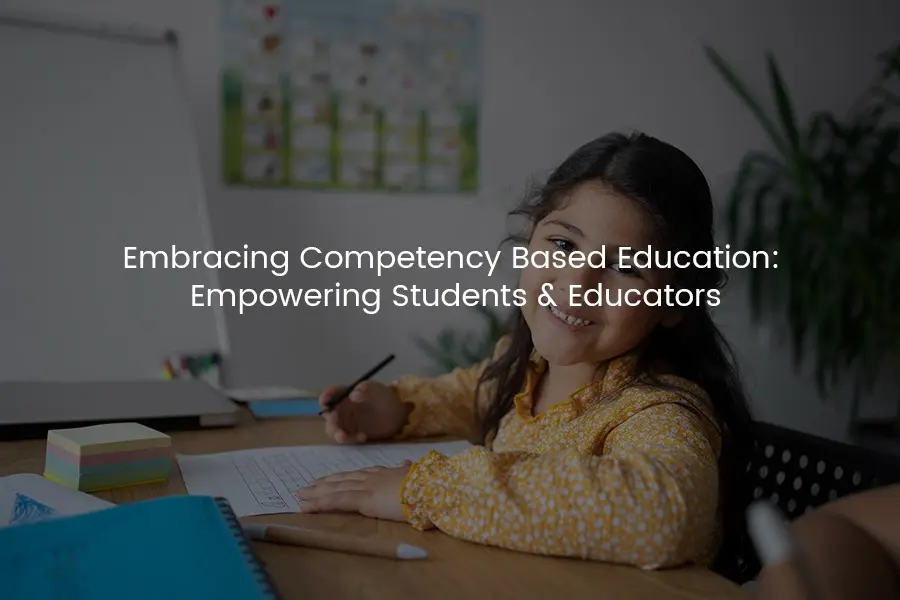The path to education is quite straightforward: Complete school, go to college, get a degree and start working. This is a conventional norm that has been followed for ages.
However, educators are constantly looking for innovative ways to make learning and teaching more effective. Competency based education (CBE) has offered a new way of learning and teaching that is truly student-centered, focusing on mastering skills at their own pace. This method is personalized to suit the learning abilities and improve the proficiency of students in learning. In CBE, learning is measured by mastery of learning instead of the number of hours spent in the classroom.
Concept of Competency Based Education Model
The competency based education model has changed the traditional education system, which requires everybody to follow a fixed plan for the whole year.
It is a learning-teaching approach that allows students to develop and grow on the basis of their ability to learn and master a skill at their own pace, regardless of the environment.
This new-age approach includes mastery of a competency, meaningful assessments, personalized support for each student and application of knowledge.
Educators play a crucial role in this model, providing differentiated support based on their individual learning needs to promote equity, allowing students to learn at their own pace and foster healthy competition and compassion.
What is Important, Competition or Competence in Education?
Competitions have always been fundamental in educational institutions.Its essence lies in outperforming peers, working as an incentive for students to stay motivated and work harder.
However, competition also raises concerns about stress, pressure, low self-esteem and rivalry. It is crucial to understand the difference between healthy competition and unhealthy competition.
Healthy competition brings out the best in students and fosters collaboration, innovation, and continuous learning. Traditional education is deeply rooted in promoting competitiveness, where children have an innate desire to compare themselves with others. This makes the role of competency in schools more profound.
It is a set of skills, abilities, and knowledge that are measurable, relevant and can be applied throughout a student’s life.
Competency based education schools focus on a structure of learning that aims at viable learning goals, leading to a more equitable learning experience. Competency is more important than competition in education, as it empowers students with the knowledge, attitudes and skills that they need to successfully navigate their personal journeys in learning and a thriving future.
In a CBE model, every learner is well-equipped with everything they need to achieve their full potential and master competencies through personalized support and flexible pathways.
Principles of Competency Based Education
1. Promoting Equity in Education
One primary principle of competency based education is equity. This does not imply providing every student with the same thing. Equity means empowering students with everything they need to achieve their goals without any bias. In CBE, students are given a personalized learning experience depending on their strengths and weaknesses, giving them a fair chance for success. An inclusive environment makes students feel safer and welcome, inspiring educators to foster such an environment.
2. Importance to Measurable Competencies
Competencies must be well-defined and determined to be set as goals for learners. Instead of focusing on just knowledge, competency focuses on a practical and thorough understanding of a particular subject. Competencies are based on:
- Applying knowledge to real-life issues and challenges
- Mastery of relevant skills
- Grasp of crucial concepts
In order to measure results, the competency based education programs need to predetermine competencies.
3. Transparency Helps Learner Be Responsible
At the end of the day, the question lies: What are the goals of every student in a specific class? The learning objective should be clear for everyone, including students, teachers, and parents. Students need to know the following things:
- What do they need to learn?
- How will they be assessed?
- How proficiency is defined
By knowing the answers to these questions, students will be more accountable and
responsible for their education.
4. Providing the Support Learners Need
In a competency based education, students clearly understand how long they can work before seeking help. Teachers work with students through their challenges and help them use their strengths to move towards mastery. Every student is given a fair chance to succeed.
What is the Difference Between Competent and Competitive?
Children are often subject to a lot of competition at schools, so whether it helps in their overall development or causes more harm than good has been a matter of conversation for years. Young minds are constantly subject to comparison at a tender age, feeding them the idea of coming first in a rat race of competition.
The core problem lies in the education system, which merely revolves around completing tasks and taking tests and exams, ultimately shaping their minds to think they need to compete with everyone. This puts unnecessary pressure on their young minds, burdening them with unrealistic expectations. The focus needs to shift from just grasping information to competency.
The debates between competence vs competition in education have been more profound than before, given rising concerns about mental well-being.
Competition can cause unnecessary pressure, while competency can help develop social, emotional and cognitive thinking skills. Healthy competition and competency can go hand-in-hand to help students prepare themselves & embrace failures and real-life situations. Competency in specific skills can be used to maximize potential and make a stand out in a progressive society.
Advantages and disadvantages of competency-based education
Competency based education focuses on what students really learn and not on the mere completion of formal exams. CBE learning has revolutionized the education system and student learning, preparing them for a future in the dynamic and competitive world.
Advantages of Competency Based Education
- Self Paced Learning: One of the main reasons why people are shifting towards competency based education is cause it is self-paced. It focuses on outcome, unlike the traditional education system that focuses on the number of hours spent in the classroom. CBE allows students to learn independently and is not restricted to a rigid learning process and structure. Once students feel they have mastered the learning material, they can take a formal assessment and move ahead with the next learning material.
- Flexible Learning: The competency based education model is flexible and tailored for every individual learner. It does not include a rigid schedule, which implies that students can control learning material, projects, and assessments and enter programs at any level.
- Focuses on Mastering Skills: CBE is designed to help students master skills and competency development, as the subjects are structured around specific competencies. Students pursuing competency based education are equipped with practical skills that are highly relevant in a dynamic and competitive world.
- Promotes Equity & Empowers Students: Personalized learning is the core of CBE. It provides students with the time and support needed to master a competency, regardless of their prior learning experience or background. This empowerment allows for equity in mastery of knowledge and skills in their program’s curriculum, offering every student a fair chance to succeed.
Disadvantages of Competency Based Education
- Assessment Challenges: Evaluating each student’s mastery of a specific competency can be challenging. This requires teachers to define and determine key competencies for every class, making it difficult to assess progress.
- Lack of Predefined Structure: Traditional education has a redefined structure, such as a set timetable, defined timelines to complete courses, etc., that competency based education programs lack.
These limitations can be overcome by incorporating accurate and relevant information, connecting with community experts, collecting well-researched material, and integrating it into the curriculum to optimize the learning and teaching experience.
How EmpowerEd is Revolutionising Educational Landscape
Our fifth edition of this series focused on “Competition to Competence.”
EmpowerED is a school wellness program emphasizing student well-being through expert-led webinars on nutrition, stress management, and resilience. Our vision is to make health and fitness accessible to students, principals, and teachers across schools in India.
The insightful session featured Dr. Anju Chazot, Founder-Director, Mahatma Gandhi International School, and Mr. Ganesh Kohli, Founder, IC3 Movement. This session explored the shift from a competition-driven approach to a competence-focused mindset in education, with insights from experts on fostering holistic growth in students.
In Conclusion
Competency based learning is a teaching and learning approach that evaluates a student’s ability to use their skills and knowledge instead of the number of years they spend in the classroom. This student-centric approach, which is the core of CBE, offers a personalized and flexible approach with measurable results and allows students to learn at their own speed. This approach has improved learning and performance, allowing students to think out of the box and become visionary leaders.




